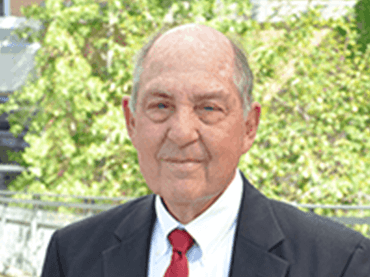The Challenge
Dr. Scott Nettrour, a retired orthopaedic surgeon, resides in Pittsburgh’s North Hills. He lives on an 18-acre specimen tree farm his family has owned since the 1950s.
The 81-year-old spends his time maintaining the grounds, mowing the lawn in summer, and clearing broken branches after ice storms in winter.
“It was nights and weekend work for a practicing doctor,” he says. “Now it’s what I do every day.”
Though he hires a crew to help him take care of the farm, Dr. Nettrour plays an active part of its upkeep. The work requires him to be mobile and run heavy equipment if needed — a task he doesn’t take for granted.
After developing foot ulcers caused by type 2 diabetes, he had to have both feet amputated at the mid-foot regions. He needed to use prosthetics, limiting his mobility.
Foot ulcers are common among people with diabetes, who are at greater risk for other health issues. These include poor blood circulation and a loss of nerve function that can lead to numbness.
Numbness allowed the wounds on Dr. Nettrour’s feet to go unnoticed for a long time and become hard to heal.
The Path to UPMC Wound Healing Services
For two years, Dr. Nettrour received care for his diabetic foot ulcers under two foot and ankle surgeons at his former practice. But, as his wounds advanced and wouldn’t heal, his doctors referred him to UPMC Passavant Wound Healing Services in Cranberry Township, Pa.
UPMC Wound Healing Services provides customized care to people suffering from chronic nonhealing wounds using a multidisciplinary team approach. We have clinics throughout Pennsylvania and western New York.
Dr. Nettrour came to UPMC's wound clinic with three major foot ulcers, which prompted multiple surgeries including partial foot amputations. According to Dr. Nettrour, he came to the right place at the right time.
“The UPMC Passavant wound clinic is essentially the reason I have feet I can still walk on,” he says. “The team saved me from having to have a below-knee amputation. The prosthetics I have fit inside a rigid shoe, and I can walk without the shoe if needed.”
The Solution: Wound Debridement
Despite the amputations, Dr. Nettrour’s wounds persisted. Experts at the UPMC Passavant wound clinic resolved to heal his ulcers using a treatment called wound debridement.
Wound debridement involves removing infected or nonviable tissue from the site of the wound to speed healing. It can be a primary treatment or a first step of treatment, such as debridement to prepare wounds for bioengineered skin substitutes.
The wound care team then treated Dr. Nettrour with a mix of collagen and extracellular matrix products. These products encouraged growth of his skin cells to improve healing. The team also put on total contact casts — special casts that come into contact with the foot and help offload pressure.
Slowly but steadily, Dr. Nettrour’s wounds responded to treatment and started to heal. His sessions at the wound care clinic became less frequent until, eventually, he could receive treatment at home from visiting nurses.
Within a couple months, each of his three major ulcers fully healed.
The Results: Back to the Farm
Now that his wounds have healed, Dr. Nettrour is enjoying retirement taking care of his family’s land. This includes mowing, thatching leaves, and clearing away fallen branches. No matter the season, he can always find lots of work to do on his specimen tree farm.
Between the farm and doting on his nine grandchildren, he has plenty to keep him busy. And plenty to make him feel grateful to be back on his feet.
If you or a loved one suffer from a nonhealing wound, call 844-639-4712 for an appointment at a wound center near you.



















